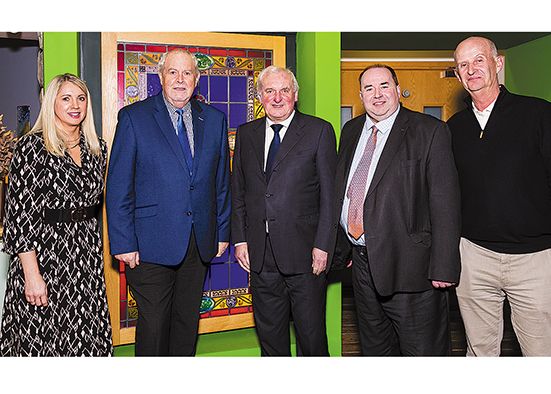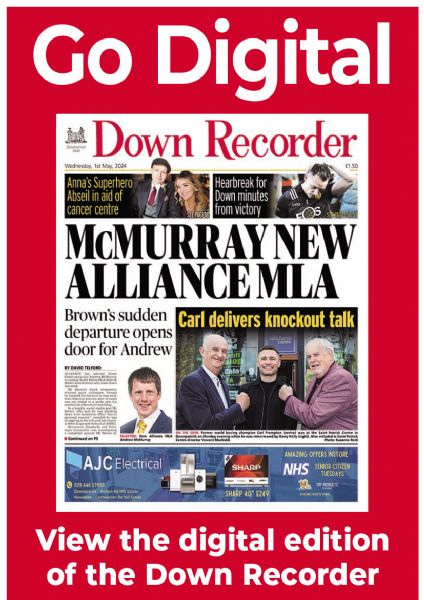Bertie Ahern on challenging times securing Good Friday Agreement
Bertie Ahern on challenging times securing Good Friday Agreement
13 March 2024

THE former Taoiseach Bertie Ahern revealed his connection to County Down, when he shared stories before a live audience at The Saint Patrick Centre in Downpatrick last week.
The 72 year-old was in conversation with broadcaster Gerry Kelly on Thursday night as part of the Centre’s annual talks series sponsored by the Department of Foreign Affairs Reconciliation Fund.
The auditorium was packed as the former Taoiseach regaled members of the audience with stories about his life and his career, notably as a key player in the negotiations leading to the Good Friday Agreement.
Mr Ahern said he had first come to the area when he had visited Newcastle as part of a trip in fifth year with St Patrick’s National School.
The former Taoiseach then recalled that he was once a frequent visitor to Ballynahinch.
“My brother Maurice is married to a Ballynahinch woman and I used to come up regularly to Ballynahinch in the 1960s and early 1970s,” he said.
His eldest brother Maurice, a former Lord Mayor of Dublin, is married to Moira Murray.
Mr Ahern said his brother got married the same weekend that Bombay Street was burned by a loyalist mob on August 15, 1969. He remembered going to Bombay Street and encountering the security presence.
The Saint Patrick Centre is a fruit of the Good Friday Agreement and Mr Ahern was invited to the centre, the world’s only permanent exhibition to St Patrick, by Dr Tim Campbell, Director of the Centre.
After taking a tour around Downpatrick, Mr Ahern declared: “It’s a beautiful, beautiful place.”
He delighted the audience with vivid memories of Down beating Kerry in the All-Ireland Gaelic football final, becoming the first county north of the border to lift the Sam Maguire Cup. “My first recollection of the all-Ireland was the 1960 final. I wasn’t at the match because I was too young and I remember the crowds and the black and red flags.”
He spoke of the crowds in Parnell Square and at the Garden of Remembrance. “It was the first time I saw supporters on top of cars shouting ‘Up Down!’
“My father was a Cork man and happy that Kerry were beaten, and even more happy that the cup was going up to the north.”
Mr Ahern spoke about key politicians that he had met over the years, including his mentor and former Taoiseach and Fianna Fail leader Charlie Haughey, as well as former Prime Minister Tony Blair.
He said politics was one of three topics of discussion in his childhood, along with sport and church life – and that Haughey was a frequent guest at his home. “That’s how I got to know him. I met Haughey when I was 13.”
Haughey was one of the most dominant and controversial figures in Irish politics due to corrupt financial dealings, ultimately resigning as Taosieach in 1992 amid revelations of a phone-tapping scandal.
Mr Ahern said that he did castigate him for his behaviour at the time, but insisted he would not change his mind about Haughey who had achieved a “huge amount” over his long career.
“Charlie was Charlie. He was a great local TD. He achieved a huge amount. I don’t quite understand why he wanted to have a huge estate in Kinsealy and it wasn’t necessary to have that.
“As a politician, he got things done. He never asked me to do anything dodgy in his life and he never pushed us into doing anything, so we just got on and did our work.
“I can’t say anything about him because he gave me a chance to be minister of state.”
He said his relationship with Tony Blair was forged before they came to power in London and Dublin as they had talked and agreed that including all the players was the best chance of the peace process succeeding. “We had a clear plan,” he said.
Asked if he trusted Blair, he replied: “Big time. I have the greatest respect for Tony Blair. Tony Blair never tried to pull a fast one on me. We were able to deal and work things out. I found he was a very straight person to deal with.”
He enjoyed warm relations with the SDLP leaders John Hume and Seamus Mallon over many years but his relationship with Sinn Fein’s Gerry Adams and Martin McGuinness was more complicated.
“I was very fond of Martin,” Mr Ahern said. “I liked Martin’s style. If Martin told me this was Thursday night I’d reckon it was Thursday night. If Gerry Adams told me it was Thursday night I would have to check. But I got on with them.”
He credited the then Ulster Unionist leader David Trimble for his role in forging the Good Friday Agreement, acknowledging he was “extraordinarily brave”.
He also said Trimble was difficult and with a “huge temper”. “David was great when he was taking the tablets,” he joked. “We got on very well in the end, but he was hard work. Sometimes he just started yelling at me.”
Ahern said that when Trimble “went on a rant” he would look over his head and focus on the premiership football league that week and then tell him he “understood”.
In hindsight, Mr Ahern suggested it would have been better if the Good Friday Agreement had more clarity around the issue of IRA weapons because “messing around with decommissioning” ultimately cost David Trimble his career and sapped so much from the peace process.
He said that the security briefing was that violence would return “within hours” if there was no deal on Good Friday 1998. “That was worrying me and Tony Blair,” he said.
He spoke with warmth about loyalist leader David Ervine and others but recounted a difficult meeting in which loyalists told him he was the “odd man out”. “You are the only one in here as far as we know who didn’t murder anyone.”
His relationship with Ian Paisley, he said, was difficult for almost a decade with “rows and shouting matches”.
“For nine and a half years he didn’t shake hands,” said Ahern. “That was difficult.”
However he did find Paisley “good to negotiate with”. “Funnily enough I got to be very friendly with him and his family. We had some funny moments when we got into serious negotiations.”
He suggested Paisley eventually did the deal because he believed “he was the only one” who could carry it out.
Ahern recalled how Paisley even said a few prayers over his republican parents’ grave on a visit to Glasnevin cemetery.
Mr Ahern said that the North was always a dominant issue in his political life and hotly debated in Fianna Fail.
But he said violence always repulsed him. “I am by nature anti-violence, anti-killing and anti-people fighting. I have always been that way.”
Asked why he joined Fianna Fail, Mr Ahern replied that he would not have been able to join any other party if he wanted to keep living at home. “I would have been thrown out of the house – if you call that a choice.”
His Cork-born parents were of republican stock. He said his mother never got over how the Black and Tans dragged her invalid father out of bed in their West Cork home and left him in a ditch.
“They left him for dead and that was bad enough. Then they came back another time just before Christmas when they had 40 geese ready for a few quid for Christmas and the Black and Tans shot all the geese. My mother’s love for the Tans had no end.”
She died just days before the Good Friday Agreement was finalised and Mr Ahern famously left the talks to go to her funeral before returning hours later.
“My ma was a tough woman and she would have wanted me to get on with the job,” he remarked.
Although he normally would not take a drink during Holy Week, he said he was on the flight home from the negotiations when someone produced a bottle of champagne and he drank the whole lot.
He supported a review of the Good Friday Agreement tackling the problem of a single party being able to collapse the institutions. “You have got to get the rules so that doesn’t happen,” he said.
Ahern said the focus on a united Ireland should instead concentrate on making the Good Friday Agreement work and on building a “New Ireland”.
He said there was no preparation on practical issues such as the court service and policing.
“I think rushing it is the wrong thing to do. I would like to see that happening over time. I think arguing every day about a united Ireland will only ensure that you keep it as something that won’t happen in the foreseeable future.”
Asked by a member of the audience about becoming Irish president, Mr Ahern once again did not rule it out, joking: “I’m looking for canvassers.”

